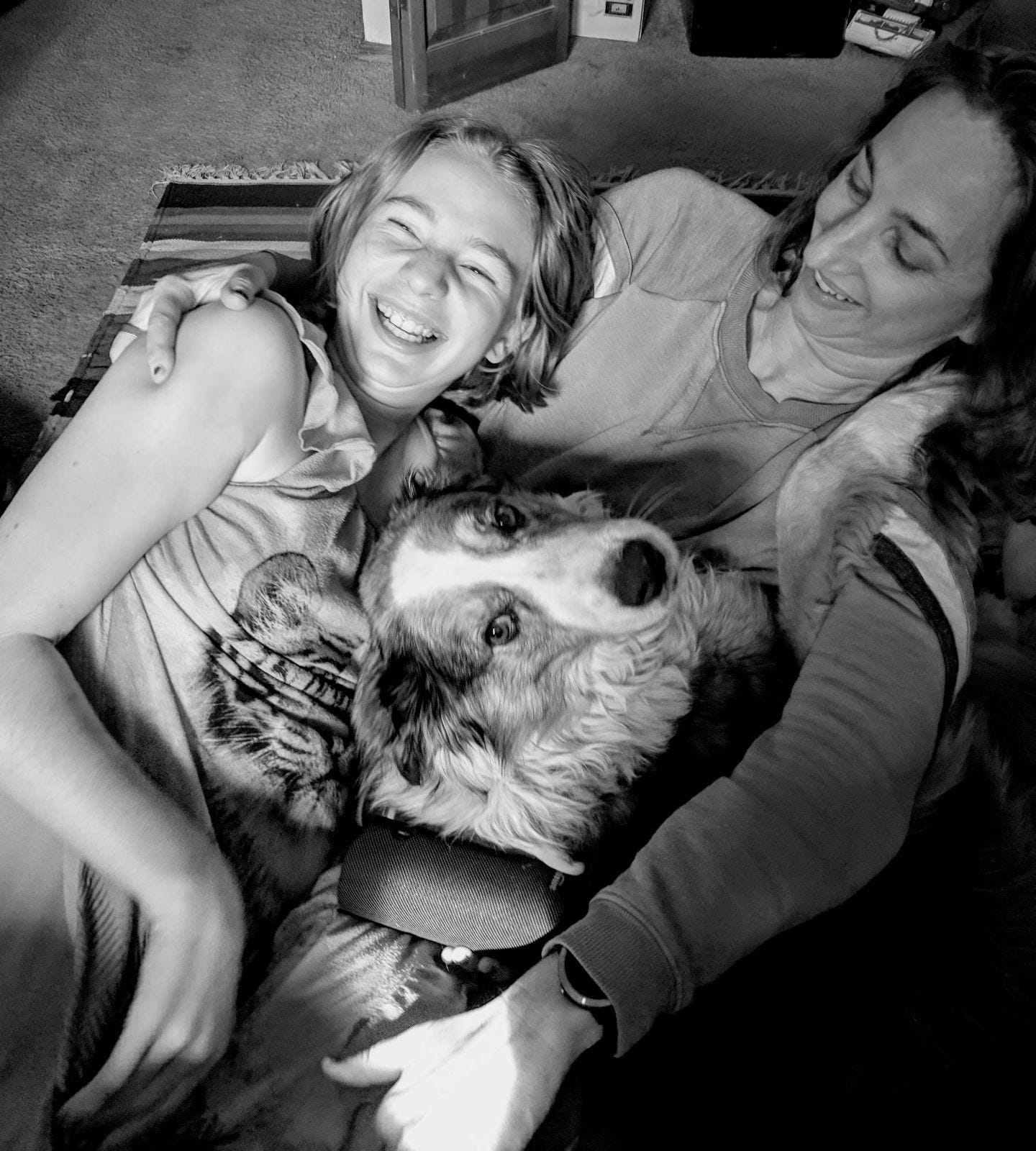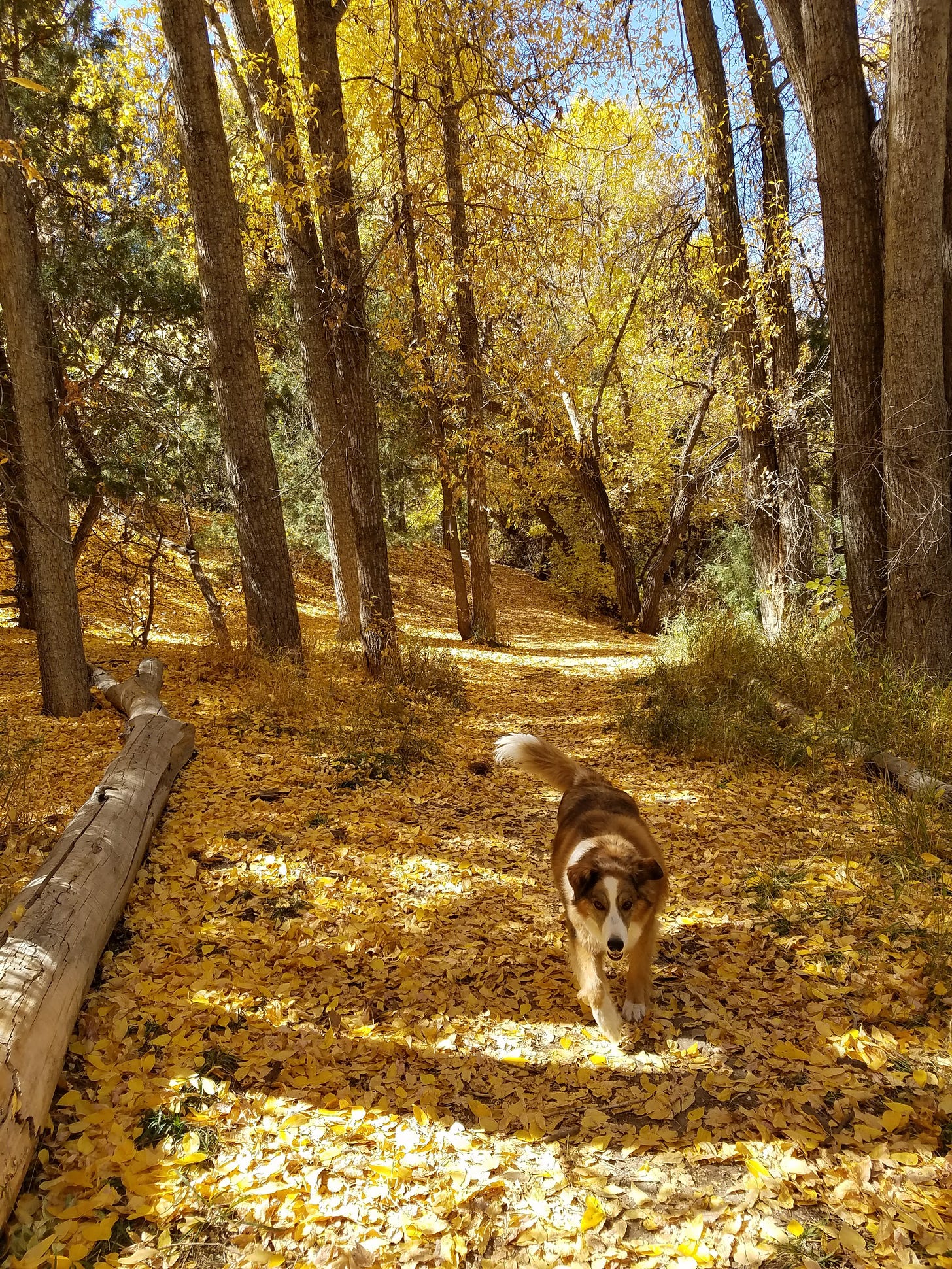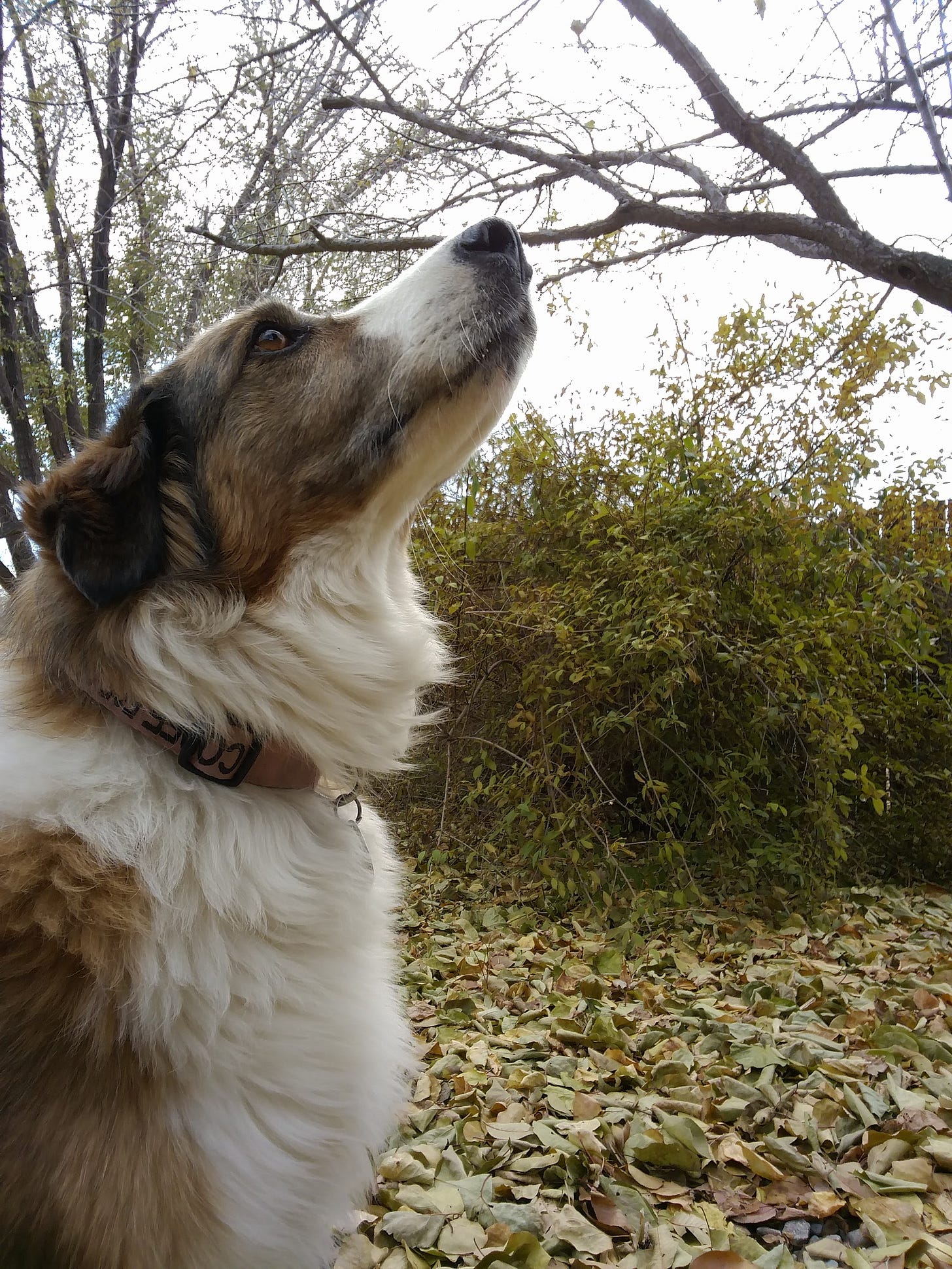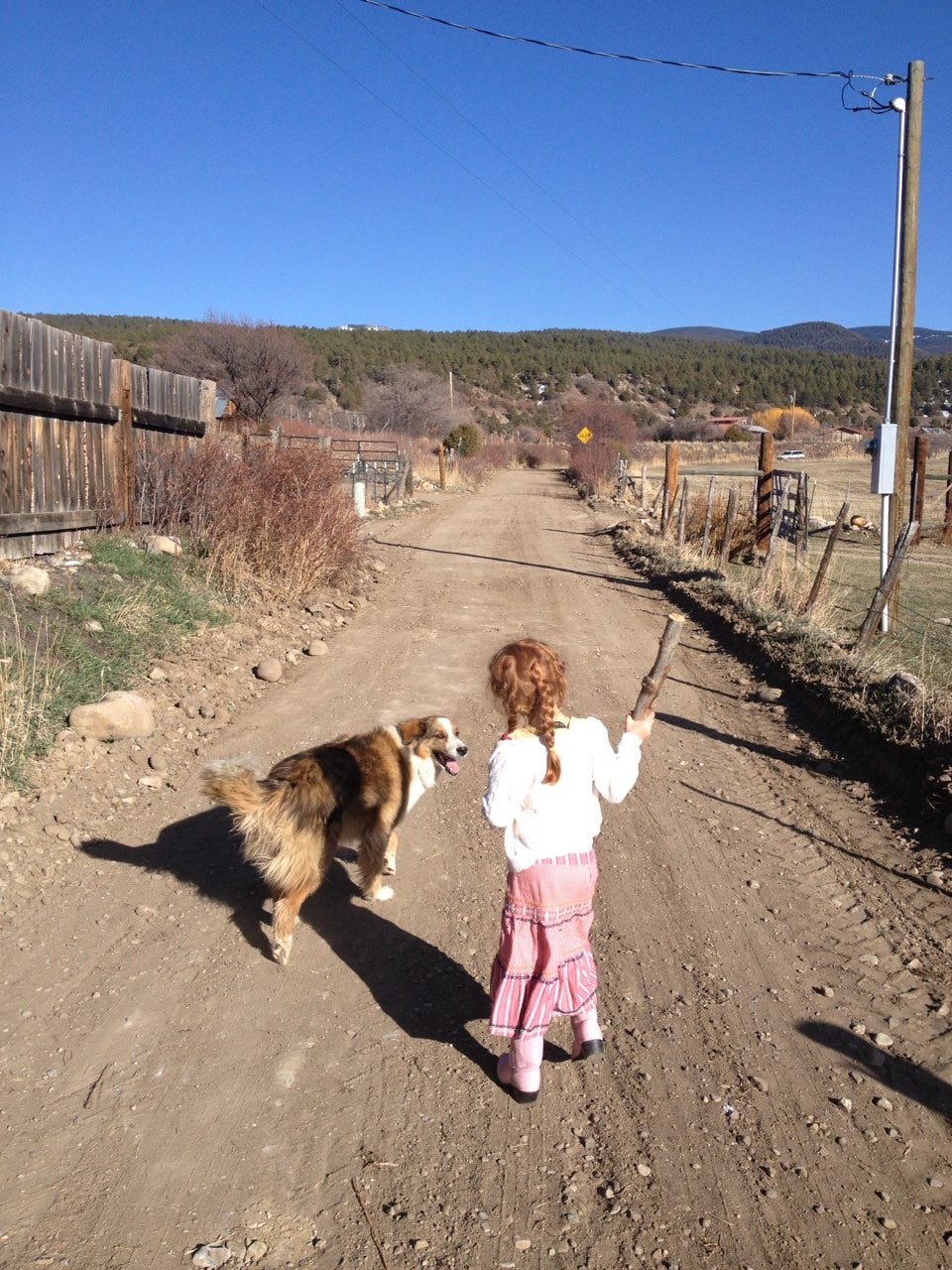Read Part One here.
When our 16-year-old dog Codee April died, I initially told no one. Part of me was keeping it close and the other part of me didn’t think anyone would understand. Instead, I did what you do when your dog dies, I went back to work. Unfortunately, this was a big mistake.
The next day, I taught a couple yoga classes at the spa in the morning. I was late. I showed up exhausted and distracted. I felt nauseous, my stomach tight and riling. But yoga is healing for me and so I was able to breathe through. I was also grateful that no one signed up for a third class. After, I stayed to soak in the mineral springs because my instinct was to be with water. In the pools, my grief floated and spread through my blood, my veins, rivulets to my heart, the mother ocean of my body. My saltwater tears joined the healing waters of the mineral springs, streaming to the watershed to join the ocean from whence they came, journeying into the larger pool of existence.
Grief feels like spilling. Lao Tzu says, "Our bodies are water walking on the earth" because we are primarily composed of water. We are walking vessels of water, but we are broken and leaking, dripping and spilling in each footstep upon the Earth and each step is infused with all the grief we’ve ever experienced, and our ancestors have experienced, and the Earth has experienced.
I wasn’t soaking long before the spa attendees came around with their signs. Lightning close, please leave the pools. I didn’t mind. I was done. As I walked through the drizzle and drove home through the storm, it occurred to me that the Sky must be grieving too. Windshield wipers swished back and forth, keeping time with my tears. I let them fall and pool in my lap. I imagined carrying them around, sprinkling them on sunflowers and apple trees. I wanted to match the Sky’s thunderous grief. No tear unshed, no tear wasted. Only a storm of such magnitude, thundering and crashing, would be enough to grieve Codee. Let it out, Mother. Let it out.
Because of course, this grief isn’t just about my dog.
Each time we grieve anew, we are grieving for every loss that came before. Grief is an intense longing. It is a longing for something you once had that you no longer have and miss dearly, wishing you could have it again or wishing it was like it used to be. Something we once held precious has been torn from our bodies and it leaves a void, like a place carved out of our ribs where if we pressed gently, we could feel the indentation of missing still present.
Each new loss conjures an accumulation of grief that we have held in our bodies, all the missing pieces once dormant reanimate and vibrate with pain again. In Anne Lamott's book, Plan B: Further Thoughts on Faith, she writes, “You will lose someone you can’t live without, and your heart will be badly broken, and the bad news is that you never completely get over the loss of your beloved. But this is also the good news. They live forever in your broken heart that doesn’t seal back up.”
When I returned home from work, I had that terrible moment when I remembered that Codee wasn’t there like she had been every day for the last fourteen and a half years to greet me when I pulled into the driveway or opened the front door. Even in the last couple of years when she could barely jump, she still made a motion like a puppy leaping in front of the car with excitement to see me. I had to slam on my brakes because I no longer trusted her agility to sweep her out of harm’s way. Even when she couldn’t hear anymore and I had already been home for a few minutes before she finally noticed, she perked up her ears and stared at me wide-eyed and I went to her so she wouldn’t have to make the effort to stand. For the first time, there was no Codee there to greet me and it hit so hard. I missed her so much. I began to cry again and an unusual northern wind that hadn’t been there before passed over me. I felt her presence. I felt her telling me she was still there with me; she was still greeting me.
I was very lonely without her, and the weight of grief was crippling. I wanted to do nothing. I just wanted to sleep and wait for time to pass, but I had to go back to work again the next day.
This time, I was putting on my tour guide hat, a summer job I picked up mostly for fun and experience. I only had two women on my tour that day, and they were very kind. I was doing my best to keep it together, but I was leaking around my seams. We had a new tour van that day that I had never driven. I rode over a traffic cone, and it got stuck in the wheel well, an embarrassing way to start the tour. Otherwise, I thought everything had gone okay until my boss emailed me a week later to tell me that she received several complaints about how rude and erratic I was acting (not from the guests, but from other people I work with). I was shocked. I literally had no idea. I thought I had been relatively calm.
On the phone, I warned her I was emotional due to life circumstances, but she still rebuked me for being tearful, unprofessional, and raising my voice. It was terrible. Awful. I finally came out and told her. “My dog died.” She was the first person I told, and it burst out of me like word vomit. She immediately paused and said, “I am so sorry. That is the worst thing to happen to someone. I am truly sorry for your loss.” I took a deep breath and apologized for my behavior.
I immediately made an appointment with my chiropractor for Network Spinal Analysis. She helped me to see that I was trying so hard to keep everything under control that I wasn’t allowing myself to fully grieve. My emotions were unconsciously coming out in inappropriate ways. I needed to let myself be messy, to fall apart, to be real, to be a basket case. I needed to lean into the Elizabeth Gilbert quote, “Embrace the glorious mess that you are.” I asked my body to go with it, not resist it, to move into it more than ever, be in it, dance into it, feel it, don’t hold back, don’t guard myself in order to be perceived as something that makes others more comfortable, the mask of normalcy, of rational, of together and focused. Masks are exhausting.
I realized that I needed to start telling people what I was going through.
In her book, Grief is Love, Marisa Renee Lee writes, “Your grief is yours alone, but you don't have to manage every aspect of grief alone. You cannot do that. Give a voice to what you're feeling. Find the people who value you, and even if it makes you feel weird or uncomfortable, tell them some portion of your truth… Grief is nothing to be ashamed of. Grief is love.” At an ancestral trauma retreat in August, I had discovered that shame is something I inherited. The inclination to keep my difficult emotions to myself as a means of protection, to withstand vulnerability and to shelter others from my pain, has been passed down to me from generation to generation. The shame of vulnerability manifests in dishonesty, isolation and in some ways, withheld love. Because expressions of grief and vulnerability are also expressions of love. "We cultivate love when we allow our most vulnerable and powerful selves to be deeply seen and known,” social researcher Dr. Brené Brown writes in her book, The Gifts of Imperfection.
I went home and posted on Facebook to my friends, family and community that Codee had passed away two weeks ago. I texted my parents and let them know. I started telling everyone I knew. When someone asked me how I was doing, I told them my dog died, even though it made me tear up in public. The most beautiful and surprising outcome was to discover that everyone understood. Everyone knew how horrible this experience was for me. Almost, everyone had lost a pet at some point and no one thought it was silly that I was grieving so hard for a dog. There was nothing to feel weird about, uncomfortable or ashamed of.
In The Smell of Rain on Dust, Martin Prechtel says, “Grief expressed out loud, whether in or out of character, unchoreographed and honest, for someone we have lost, or a country or home we have lost, is in itself the greatest praise we could ever give them. Grief is praise, because it is the natural way love honors what it misses.”
Grief is often ignored in our society. Perhaps because it makes people uncomfortable, reminding them of their own grief, reopening their own wounds. Because of this people in grief often feel abnormal and alone. The catch is that if we spoke about grief more openly, then others could do the same. Allowing ourselves to be more present and accepting grief means that we could praise what is lost as much as we praise what remains.
I had allowed myself to open my heart and share what I was going through even though it felt scary, but there was one more thing I still needed to do. I needed to let Codee go.
Read Part Three here.
JOIN US TONIGHT September 30th 6-7:30pm Mountain Time FOR FREE FOR OUR MONTHLY NEW MOON RITUAL. Click on photo below to register for Zoom link.
.







Love this line (and so many others) “Each new loss conjures an accumulation of grief that we have held in our bodies, all the missing pieces once dormant reanimate and vibrate with pain again.” So painfully true.
Petting my pupper deeper with this read, and sending you a big old hug. Thanks for processing your grief w us, Jo. Rest in puddles and petunias, Codee!